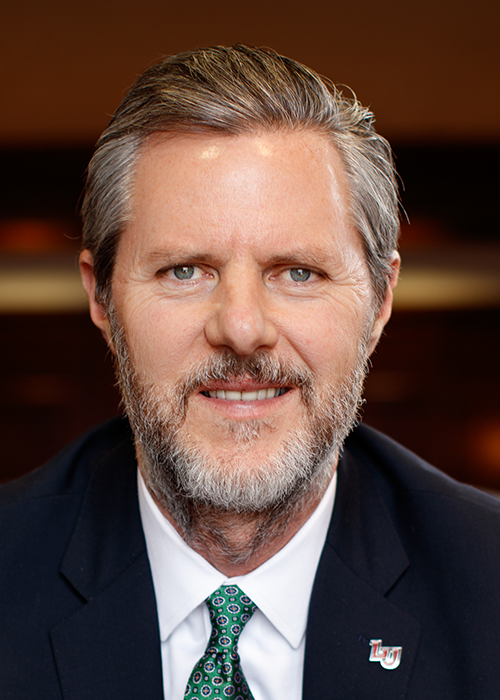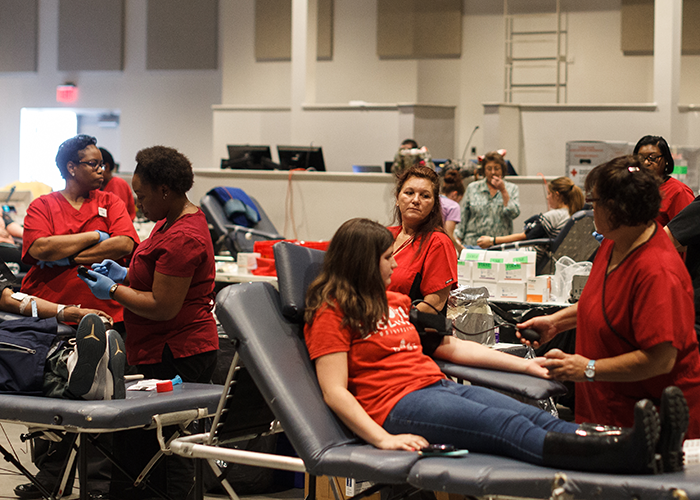Aiming high
Liberty University steps out onto the national stage to further its mission
Aiming high
Liberty University steps out onto the national stage to further its mission
When it traveled to Texas in September to face the Baylor University Bears, Liberty University’s football team was a 34-point underdog.
Baylor has long played at the highest level of college sports, making an appearance in the Cotton Bowl in 2015. The Liberty Flames, by contrast, have been longtime members of the NCAA’s Football Championship Subdivision (FCS) where it plays opponents such as Charleston Southern, Gardner-Webb and Kennesaw State.
That backstory, however, didn’t stop the Flames from winning, 48-45. The upset is just one sign that Liberty believes it is ready to compete on the nation’s biggest stage.
“It was a big moment to realize that we can compete and win against an opponent of Baylor’s caliber because those are the types of teams that we’re going to be playing beginning next year,” says Ian McCaw, Baylor’s former athletic director who joined Liberty in the same position last year.
Liberty has been preparing to take on the likes of Baylor for some time. During the past decade, the university has been taking steps to move up to the elite Football Bowl Subdivision (FBS), where teams like Alabama and Virginia Tech play before national television audiences.
While waiting for NCAA approval, Liberty has moved forward as if FBS membership was inevitable. In 2011, the school hired head coach Turner Gill, who previously led the Kansas Jayhawks, a member of the Big 12 Conference,
Since 2007, Liberty also has spent more than $200 million building and upgrading all of its athletic facilities, including a $29 million indoor football practice field and the 60,000-square-foot Liberty Athletics Center. Plans are gearing up to expand Williams Stadium from 19,200 seats to 25,000, while also adding new video boards, more restrooms, concession areas and better Wi-Fi for fans.
“Football is really the economic engine of an athletic program and such a big part of establishing a university’s brand,” McCaw says. “And being an FBS team just really elevates the profile of the football team, but also the entire university because it just makes us so much more visible in terms of national exposure.”
In February, NCAA finally granted Liberty’s request to compete as an FBS team, despite the fact that it has no conference affiliation at that level. The team will play its first full season as an FBS independent in 2019.

Rebel with a cause
In many areas Liberty is pushing the envelope and gaining a higher visibility.
“We just don’t think that we need to do things the same way other academic institutions do them just because that’s the way they’ve always done them,” says Falwell. “We’re willing to think outside of the box and take risks.”
For example, Liberty has been the primary sponsor of NASCAR driver William Byron, a Liberty student, since his career started in 2014. Byron, the top driver in the 2017 Xfinity Series, was recently selected by Hendrick Motorsports to drive the No. 24 car in the elite Monster Energy Cup series. The 20-year-old sophomore will make his debut at the Daytona 500 in February.
Liberty will continue to be his primary sponsor through at least 2019.
Meanwhile, Liberty’s Cinematic Arts Department showed its film “Extraordinary” during a one-night event in September at more than 400 theaters across the country. More than 60 Liberty students worked on the one-hour-and-40-minute film, which tells the story of Liberty professor David Horton, an ultra-marathon runner.
“It’s the first time in cinema history that a film school or department has ever had a nationwide theatrical release,” says Stephan Schultze, Liberty’s executive director of cinematic arts.
“Extraordinary” is the fourth feature film Liberty has produced. The university’s ambition is to build a department that can compete with more well-established film schools, such as Columbia University, New York University and the University of Southern California.
“It usually takes 20 to 30 years to build a program where you’re actually doing movies and getting them seen,” Schultze says, noting that the school sought support and financial help from industry players like Working Title Agency, Fathom Events and Sony Provident. “Now, we’re looking to expand into a television series so our students can graduate into a job.”
This type of exposure is reaping benefits for Liberty. Its residential student enrollment hit a record high this fall, with 15,566 students, a 2 percent increase over 2016 numbers. Liberty’s online program is growing at a rate of 10 percent a year, with 85,000 to 88,000 students expected to take courses in 2017-18.
In moving to the FBS, Liberty also will be able to increase the number of football scholarships it offers from 63 to 85. “It’s opened us up to a whole new pool of student athletes,” says McCaw. “We already have some commitments from a number of top prospects who have multiple FBS offers, so it’s really made a dramatic change in our recruiting process and we’ve just gotten started.”
Student quality is also rising. According to Schultze, one in six Liberty film students has a 4.0 grade point average and 65 percent have a GPA of 3.5 or higher. This year’s incoming freshman class had an average GPA of 3.5 and scored an average of 1079 on the SAT, the highest ever for the school. Liberty’s College of Osteopathic Medicine received 4,000 applications this fall for 160 slots.
Taking on controversy
Liberty attracts attention by being willing to take a stand on sometimes white-hot national issues. That poses risks, Falwell admits.
“We know it makes us a bit of a target, but we’re just going to keep moving forward pursuing our vision and our plans, and we’re not afraid to stand up for what we believe in,” he says.
In the midst of an ongoing national argument about gun control, Liberty is set to open a $1 million outdoor gun range, the first part of a multiphase project that will also include several other shooting venues.
Liberty already allows licensed students and faculty to carry concealed weapons on campus. More than 3,000 students have completed a free university-provided firearms safety class during the past 24 months.
Not surprisingly, news of the new 60-acre shooting center prompted headlines in a number of national publications, including The Washington Post and the New York Daily News, although about 30 colleges also have on-campus gun ranges.
“The majority of our students are pro-Second Amendment, and they have told us for a long time that they want to participate in this kind of activity,” says Brad Butler, Liberty’s planning coordinator who notes students must complete the firearms safety class before using the shooting range. “We’re providing a safe and convenient venue for them to come out and shoot shotguns, pistols, rifles, three-gun competition, skeet, archery, paintball, a whole myriad of activities.”
Liberty expects to eventually have venues for all Olympic shooting sports, a move that prompted a junior national champion skeet shooter from South Africa to enroll at Liberty.
Liberty also has launched the Center for Law and Government, a public policy program with a strong focus on self-government, free markets and the rule of law.
“We think we have a unique opportunity here to hold thoughtful and courteous debate and serious academic study on these issues and to hear different points of view from high-profile guests,” says Robert Hurt, a former congressman from Virginia’s 5th District, who is the center’s executive director.
Last spring, the center hosted Constitution Week, bringing in federal judges; representatives from the Clinton, Bush and Obama administrations; and several U.S. lawmakers, including Rep. Trey Gowdy and Sen. Tim Scott, both Republicans from South Carolina. In addition, students have taken several trips to Washington, meeting with, among others, Democratic Sen. Tim Kaine of Virginia.
Falwell’s staunch support for President Trump occasionally has drawn criticism from some Liberty students and alumni. Falwell defended the president when he came under fire for blaming “both sides” for the violence that occurred at an August alt-right rally in Charlottesville. In protest, a small group of alumni began a campaign urging fellow graduates to return their Liberty diplomas.
In a statement, Liberty University said it “strongly supports our students’ right to express their own political opinions, including any opposition they have to their school leader’s relationship with this president of the U.S., just as other students may have opposed leadership of liberal institutions supporting previous presidents.”
Living out faith
Organizations that get bigger and more nationally prominent run the risk of losing touch with their core mission, but Liberty officials say they are taking steps to ensure that it remains a faith-based school.
“I like to say that Liberty is conservative with a small ‘c,’ but we are Christian with a capital ‘C,’” says Falwell. “We’re not looking for students who feel entitled to the best that life has to offer, but students who are looking to be equipped with what they need to go out and serve others as Christ calls us to do and to give their very best in their chosen field.”
The school began an initiative this fall called “We the Champions.” The project gives students, faculty, staff and alumni the opportunity to share their experience at the university.
“As we have found ourselves more on the national stage, we realized that we’re at a pivotal moment where we have a chance to really define and show exactly who we are and not let other people do it for us,” says Kristin Conrad, Liberty’s vice president of communications and marketing.
“A champion isn’t just someone who succeeds in business or who wins on the field, it’s someone who lives out their faith by showing the Fruits of the Spirit — kindness, joy, peace, patience, charity, faithfulness — in everything that they do,” Conrad explains. “And so we wanted to ask: What does that look like in 2017?”
Stories told include a Liberty student who collected 22,000 shoes and sent them to his home country, the Democratic Republic of Congo, and a 2010 Liberty graduate who has built an international ministry to combat human trafficking.
Students and staff provide more than 500,000 hours of volunteer service each year locally, nationally and internationally, says David Nasser, Liberty’s senior vicepresident of spiritual development.

Last year, Liberty started its Send Now program, which trains student volunteers to help with disaster relief and other emergencies. Already, 1,900 Liberty students have registered to be part of the program.
This fall, numerous groups of Liberty students were sent to help in areas affected by Hurricane Harvey, Hurricane Irma, Hurricane Jose, the Mexican earthquake and the California wildfires.
Falwell notes that none of Liberty’s initiatives are pursued in a vacuum, including the effort to play at the highest level of college football. The end goal is still to train champions for Christianity.
“Football is not our mission, of course, but it shines a light on our mission like nothing else ever can,” he explains.
“Athletics is a way to promote your brand, it’s the easiest way to make your school known to the public and let parents and students know what Liberty has available for them. With academics, it takes generations to develop a reputation that’s well known and well-regarded, but with sports, you can do it relatively quickly. And that’s what we’re hoping to do.”
Liberty University at a glance
Location: Lynchburg
Founded: 1971
Campus: More than 7,000 acres, Over 6.6 million square feet of building space, 385 buildings and structures, 215 classrooms
Enrollment
Total enrollment: more than 110,000
Military students: more than 30,000
International students: more than 900
Tuition, fees, housing and dining
$33,100 approximate annual undergraduate resident cost including tuition, mandatory fees, housing, and a meal plan (can be as high as $34,690 depending on the housing type and meal plan chosen)
95 percent of Liberty students receive some form of financial aid
On the Web: www.liberty.edu
n

















